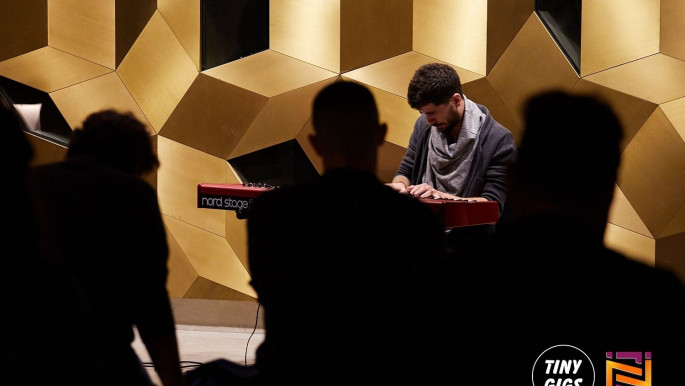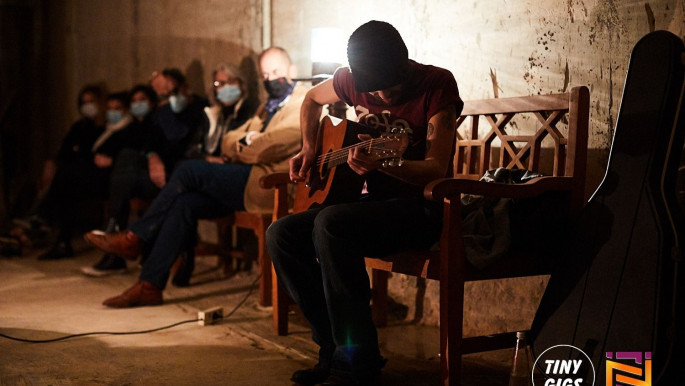Beirut Jam Sessions: How a Beirut-based collective has breathed new life into Lebanon's music industry
Meshing local talent with revered regional names, Beirut Jam Sessions have forged new, sustainable pathways for Lebanon's music industry, as the country battles national disorder and the coronavirus pandemic.
6 min read
As Lebanese politics descends further into chaos, its music gives hope to the future
In all of the political turmoil, revolutions, an explosion and Covid-19, there has been at least a positive constant in Lebanon, Beirut Jam Sessions.
Anthony Semaan founded the collective in 2012 to organise concerts, produce sessions for local and international artists.
The idea came because he wanted "to fill a gap from the lack of a music scene, as most acts at the time were either massive pop star concerts or really small shows in bars, so there was a lack of middle ground." They produce video sessions, which did not exist in the region before Beirut Jam Sessions.
"In terms of the acts we put on, it's a mixture of both local and international. At the start of Beirut Jam Sessions, it was always an international headliner. The support act would be a local band," Anthony says.
"By international, I mean regional acts from Jordan and so on. Then we would produce a video of them jamming together. And as time went on, we realised that it was difficult to do this all the time. So we ended up doing those videos with those bands alone."
Because of the pandemic, they moved exclusively online to put on performances. They recently started live shows with safety precautions a top priority.
But Anthony says they are still adapting to the different promotion methods and have been producing videos in the last nine years.
And not least because of what Lebanon has gone through in the previous 12 months while everyone "adjusts to the new reality for the time being", as Anthony explains: "In October 2019, when the revolution/uprising began, that same week, we had our last fully-fledged concert featuring the Jordanian band, Akhir Zefir. We lost all our money at that show because we already realised things were going down the drain – people weren't buying tickets, sponsors pulled out, we felt that this was the final nail in the coffin.
"We tried our best to stay alive and relevant, but then the pandemic hit. When that happened, we put together an Instagram festival that featured 160 artists from twenty-five countries over nine weeks. That included artists like Yo-Yo Ma, Cat Clyde, Tania Saleh, Yasmine Hamdan and many others," he adds.
 |
Read also: 'There's no more place for luxury': Lebanese persevere as country's economy worsens
He continues, "100% of the ticket sales went to the artists in an attempt to support them. The following month we did the same thing, but this time it was virtual. We had six artists who were displaced from the country because of the political situation. In the same format, we let the artists choose the price they wanted to sell the tickets at.
"We held the shows via Zoom, and they were very, very well received. In a nutshell, that's how we've had to adapt. We intend to continue the Tiny Gigs series both virtual and live, and that gives us another shot to see if this all works."
But with the creative industries taking a massive hit to revenue, will online sales translate to the demand for tickets in real life going forward?
"Well, everything is still closed here in Beirut, as things have either been blown up or because of Covid," Anthony explains. "So even now, when we're looking at our next concerts, I'm considering doing them just about anywhere, even on an outdoor set of stairs! We have to improvise or adapt and keep trying different things. These concerts are proving to be a shining light in a city that is quite damaged. So when we find nice spots that look really nice, we have to do something there."
 |
"The feedback has been great. I feel that we've never had more positive feedback on what we've been doing because everyone recognises that we are a platform that has still managed to stand our ground even when things have been very tough.
"Previously, we had moments when there were bombs and other types of crises going on, and we still kept going. Our artists in the past cancelled because of the situation in Lebanon, but we still kept going. When we cancel a show, we lose all the money invested because insurance companies don't cover the losses of independent concerts."
 |
Our message has always been the same, we support the artists as much as we can, and that's what I hope we can continue to do |  |
"Personally, it's not a concern of mine because I highly doubt we can face anything more destructive than what we met with the August 4 blast. So when it comes to the pandemic side of things, we take precautions. The concerts are being held in areas that can take ten times the amount of people we are admitting at the moment," he explains.
 |
Staying on a positive note, what are Anthony's hopes for his shows and Lebanon as a whole?
"My hopes for Lebanon are that we get out of this economic crisis and that we're able to get on our feet, finding some semblance of normality. Regarding Beirut Jam Sessions, all I hope for is that we keep doing what we're doing. I also hope that we can continue being active and present and that artists keep using us to our benefit. We are a platform that supports artists, and we give them exposure, content and a different audience. Our message has always been the same, we support the artists as much as we can, and that's what I hope we can continue to do."
Yousif Nur is a freelance journalist, with a particular focus on music and culture in the Arab World. His journalism work has been featured in The Guardian, Telegraph, Dazed & Confused, Middle East Eye, Vice amongst many others.
Follow him on Twitter: @yousifnur





 Follow the Middle East's top stories in English at The New Arab on Google News
Follow the Middle East's top stories in English at The New Arab on Google News


